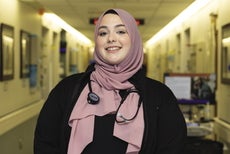
Keeping nurses in the field: Amid rising burnout, UMass Memorial’s first-year registered nurse program works to keep high retention rates
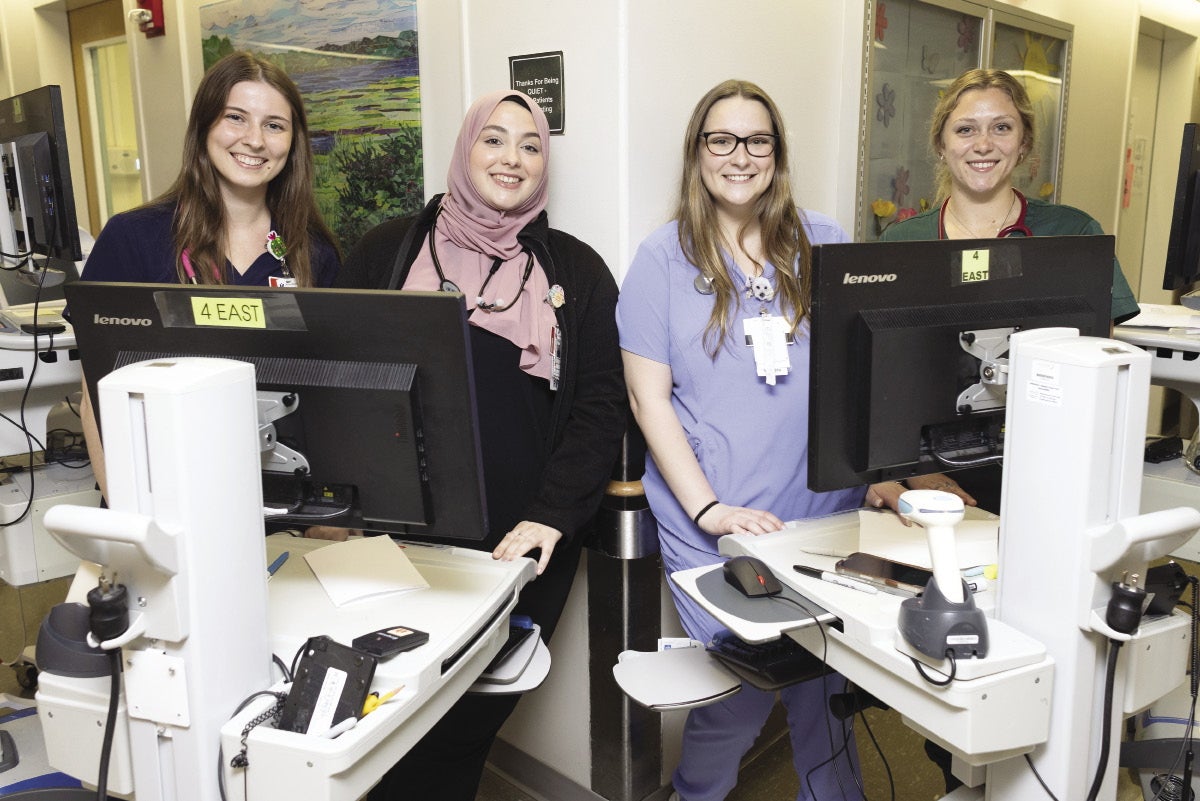 Photo | Matt Wright
(From left) Teresa Decalles, Madinah Xhemalallari, Meaghan Kelleher, and Madelyn Wilde are first-year registered nurses in UMass Memorial's New Graduate Nurse Residency Program.
Photo | Matt Wright
(From left) Teresa Decalles, Madinah Xhemalallari, Meaghan Kelleher, and Madelyn Wilde are first-year registered nurses in UMass Memorial's New Graduate Nurse Residency Program.
One in five Massachusetts nurses plan to leave the profession within two years, a figure twice as high as it was just five years ago, according to the Massachusetts Nurses Association labor union.
The problem over nurses leaving the profession comes as nurses face mounting challenges like unsafe assignments and staffing shortages, according to the 2024 edition of the MNA’s State of Nursing in Massachusetts survey.
“Nursing is going to be hard regardless. You’re with people when they’re their most vulnerable, you're with people when they need someone, when they're at arguably their lowest,” said Madinah Xhemalallari, a registered nurse and member of the New Graduate Nurse Residency Program at UMass Memorial Medical Center in Worcester.

To help prepare new nurses for the reality of the profession and combat the growing problem of burnout, UMass Memorial Medical Center in Worcester offers its New Graduate Nurse Residency Program, which over the course of 12 months seeks to center education, community, and support for those entering the field.
UMMC’s parent organization, UMass Memorial Health, now boasts a first-year registered nurse retention rate hovering between 90-95% annually.
“UMass is recognizing the need to mentor nurses and to help them and to give them a reduced patient assignment with a mentor so that they get to learn how to do nursing, right,” said David Schildmeier, MNA director of public communications.
Customizable to nurses’ needs
The New Grad program accepts three cohorts a year, totalling in about 200 residents per calendar year. The first 13 weeks of the program are considered orientation in which residents work 40 hours a week on a clinical unit with an assigned nurse preceptor and backup preceptors with one day a week reserved for class.
Classes are not meant to reteach what was taught in nursing school, said founder of the New Grad program, Karen Uttaro, who is UMMC’s senior director for professional practice, quality, and regulatory. Instead, the program bridges the gap between what nurses have been taught and the inner workings of the Medical Center.
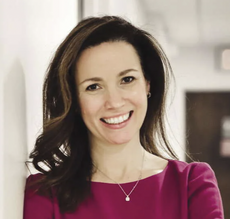
After orientation, residents work on their clinical units and come together once a month for a debrief session where they can talk about how they’re feeling, challenges they’ve encountered, and what ways they can best be supported followed by sessions with subject matter experts to talk and learn about different skills such as working with behavioral health patients or those in palliative care.
Each resident is partnered with a nursing professional development partner, who do weekly check-ins during orientation and monthly check-ins for the remainder of the program.
Though this is the standard rubric for the new grads, the program is designed to be customizable to each of the nurses allowing for them to spend more time in orientation or have fewer check-ins depending on their needs.
A mounting issue
Uttaro led the New Grad program’s first cohort of residents in 2007 and has worked to evolve the program to where it is today. Though she said the residency has seen several iterations throughout the years, there’s been one stabilizing factor.
“The one thing that has remained constant for the last almost 20 years is that new grads need support, right? They're smart people, they survived nursing school, they passed the boards. It's really the emotional aspect and connecting the dots of what they learned in school to what it looks like in an academic medical center,” Uttaro said.
The shock novice nurses can experience after being thrown onto units with very sick patients in a complex healthcare system can lead to them deciding it's not the field for them, said Uttaro.
“You superimpose really sick patients and a really dynamic environment and the inexperience that you have as a new nurse, it really is like a perfect storm in a lot of ways,” she said.
Nurses in 2024 are experiencing a myriad of issues that either weren’t there in previous decades or have been greatly exacerbated, said Schildmeier, of MNA. Staffing cuts, unsafe patient assignments, a growing mental health crisis, and increased workplace violence all contribute to nursing burnout.
“We've got a whole generation of nurses who don't know what they don't know. There's not enough staff with the time to help them find out what they don't know, and so they're out there in an environment of sink or swim,” he said. “And too many of them are sinking, and being burnt out and leaving much too early.”
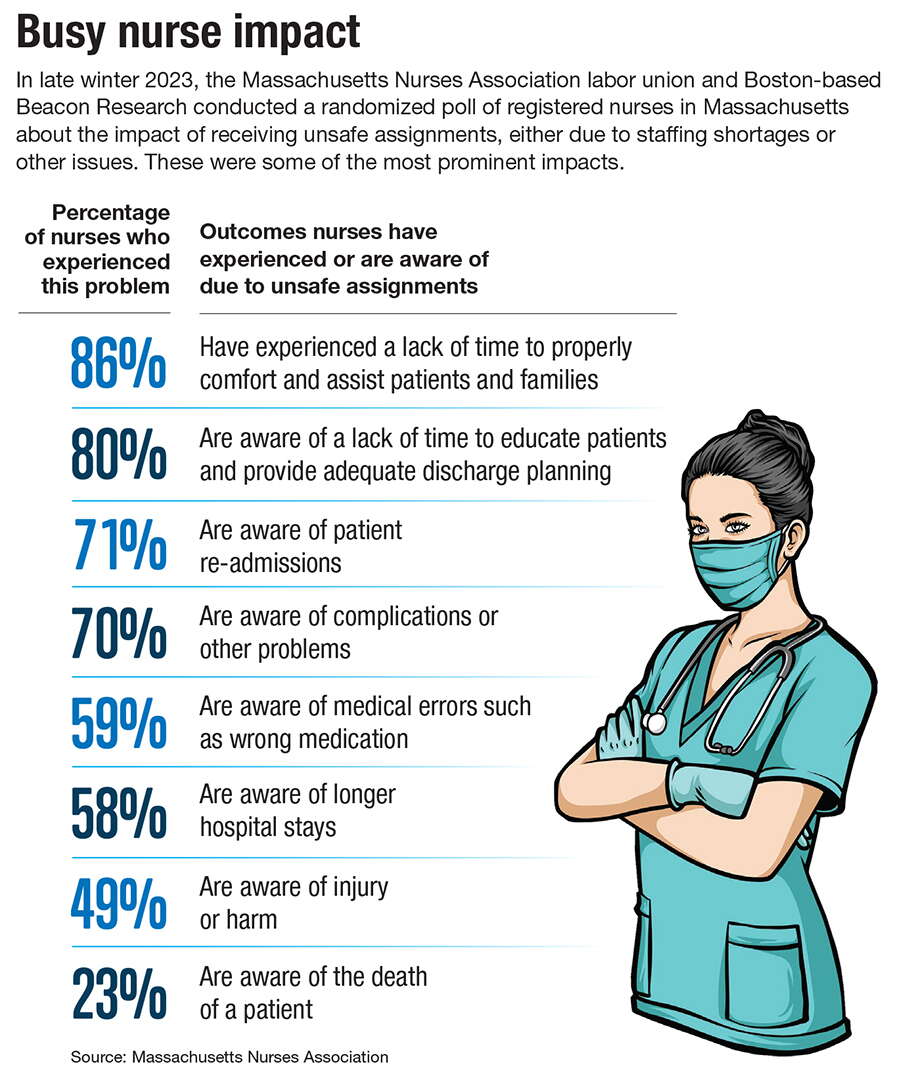
Burning, burning, gone
Between the six to nine month mark is when many nurses start to become overwhelmed, questioning if they’ve made the right career decision, said Uttaro.
“That's why we have lots of pieces of our program that are threaded throughout so we stay connected to them. So when they get to that moment, where I'm like ‘I'm tagging out. This is not for me, I can't believe I signed up,’ there's somebody right there saying ‘You got this, let's go have a cup of coffee, let's figure this out. What you're experiencing?’” Uttaro said.
Having a community can prevent burnout from happening in the first place, said Xhemalallari, the registered nurse in the UMMC New Grad program.
“That's why I wanted to pick a program where I knew that the people around me were going to make me feel safe, were going to make me feel like there were no stupid questions. And that's exactly what I found at UMass,” she said.
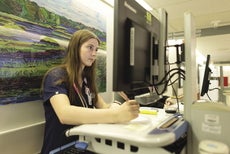
When choosing a residency program, Xhemalallari was already familiar with the New Grad program having done clinicals at UMMC and worked on the inpatient floor specializing in neurology and neurosurgery as patient care assistant while in college, the same floor she works on now. She had seen the quality of nurses graduating from the residency, helping solidify her decision to apply for the program.
“I really wanted a program that at the end was going to produce a well-rounded nurse as opposed to someone who just knows how to pass meds or knows how to document an assessment on their patient,” she said.
Along with the community aspect of the residency, Xhemalallari said the opportunity to brush up on skills with her cohort has been instrumental to her success in nursing thus far. From learning about different kinds of oxygen, to telemetry tests, to acting out and practicing having difficult conversations with coworkers, she’s grateful to have had more extensive training to prepare her for the dynamic environment that is the hospital floor.
Though Xhemalallari is content with her unit, Uttaro said other residents may decide they want to shift their nursing focus as they move through the program, and that’s okay. In fact, having the opportunity to get real-life experience with hands-on support so nurses can find their truest passions is one of the main benefits to the residency itself.
“You need to start somewhere. Get your sea legs, learn as much as you can learn, and then, dream big and figure out what the next chapter is,” said Uttaro.







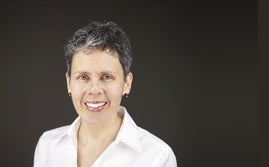





0 Comments